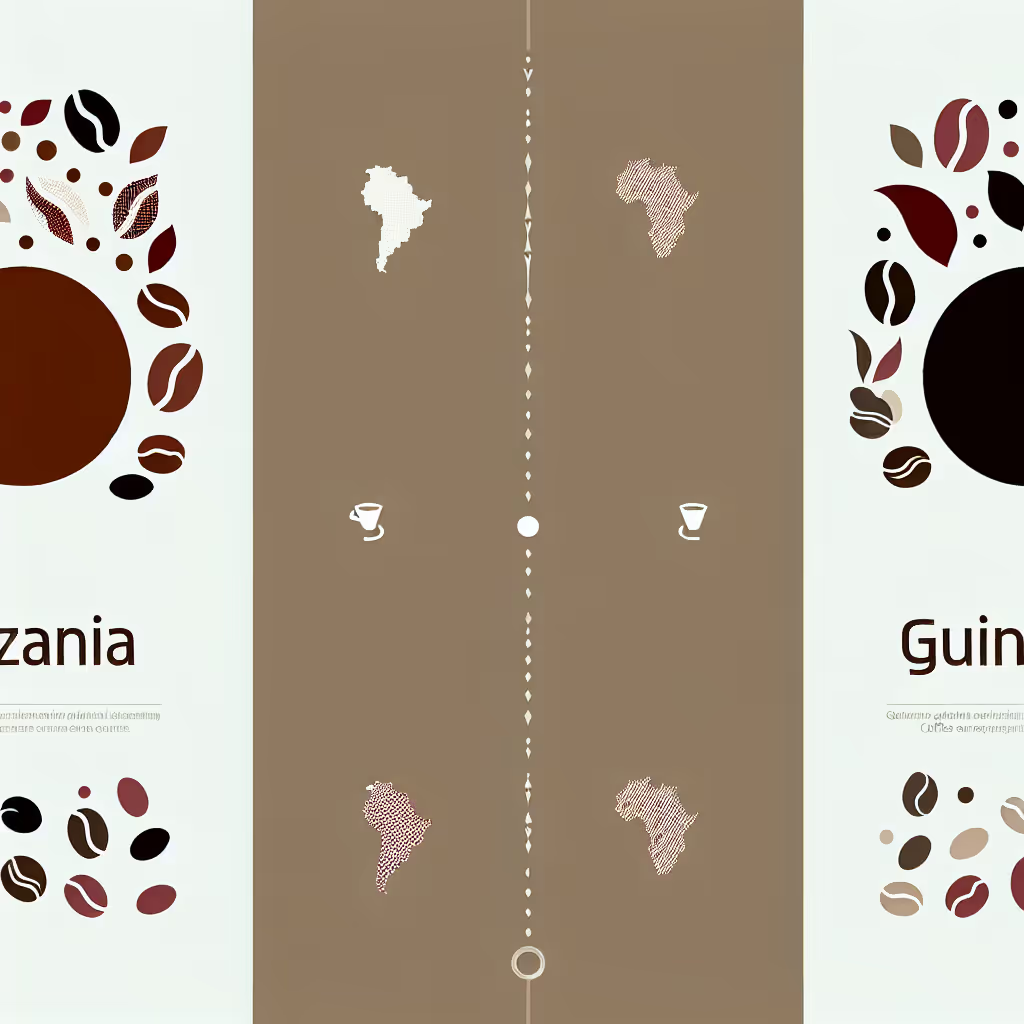Tanzanian Vs. Guinean Coffee
This comparison explores the distinct qualities of Tanzanian and Guinean coffee, highlighting their flavor profiles, growing conditions, and brewing methods to help coffee enthusiasts make informed choices.

Brief Description
Tanzanian coffee is a hidden gem in the world of specialty coffee. Grown on the slopes of Mount Kilimanjaro and in the southern highlands, these beans offer a unique flavor profile that combines bright acidity with rich, full-bodied taste. Known for their wine-like acidity and black currant notes, Tanzanian coffees are often described as having a 'soft' cup with a gentle, sweet finish. The country's diverse microclimates and traditional farming methods contribute to the distinct character of its coffee, making it a favorite among connoisseurs seeking something extraordinary.
Guinean coffee, grown in the lush highlands of Fouta Djallon, is a hidden gem in the world of African coffees. Known for its robust flavor and unique character, Guinean coffee offers a blend of Robusta strength and Arabica finesse. The region's rich soil and ideal climate contribute to a cup that's full-bodied, with a pleasant acidity and intriguing flavor notes. Despite being less known than its African counterparts, Guinean coffee is steadily gaining recognition for its distinctive profile and potential for specialty production.
Importance of Comparison
Comparing Tanzanian and Guinean coffee is crucial for coffee lovers seeking to explore lesser-known African origins. Understanding the differences in flavor profiles, growing conditions, and processing methods helps consumers expand their palate and appreciate the diversity of African coffees. This comparison also sheds light on the unique characteristics that set these origins apart in the specialty coffee market.
Key Attributes
Origin
Tanzanian
Guinean


Consumer Guide
When choosing between Tanzanian and Guinean coffee, consider your flavor preferences. Tanzanian coffee offers a bright, wine-like acidity with black currant, citrus, and dark chocolate notes, ideal for those who enjoy a complex, fruity cup. Guinean coffee provides a more robust, earthy profile with nutty and chocolate undertones, perfect for those who prefer a full-bodied experience. For brewing, Tanzanian coffee excels in pour-over and cold brew methods, while Guinean coffee shines in French press and espresso. Consider the altitude difference: Tanzanian beans grow at higher elevations (1200-2000m), potentially resulting in a more nuanced flavor compared to Guinean beans (1000-1500m). Lastly, think about supporting smaller producers, as Guinea's annual production (20,000 metric tons) is significantly less than Tanzania's (50,000 metric tons).
Expert Opinions
Coffee expert Maria Rodriguez notes, 'Tanzanian coffee's bright acidity and wine-like qualities make it a standout for pour-over enthusiasts, while Guinean coffee's robustness is perfect for espresso lovers.' Roaster John Smith adds, 'The natural processing common in Guinea brings out a unique earthiness that contrasts beautifully with Tanzania's washed coffees, offering a spectrum of flavors for African coffee fans.'
FAQs
Tanzanian coffee is known for its bright acidity with black currant, citrus, and dark chocolate notes, offering a complex and fruity profile. Guinean coffee, on the other hand, presents a more robust, earthy flavor with nutty and chocolate undertones, resulting in a full-bodied cup.
Tanzanian coffee is typically grown at higher altitudes (1200-2000m) on the slopes of Mount Kilimanjaro and in the southern highlands, contributing to its complex flavor profile. Guinean coffee is grown in the highlands of Fouta Djallon at slightly lower elevations (1000-1500m), which influences its robust character and unique taste.
For Tanzanian coffee, pour-over, French press, and cold brew methods are recommended to highlight its bright acidity and complex flavors. Guinean coffee excels in French press, espresso, and cold brew preparations, which complement its full-bodied nature and bring out its earthy, nutty notes.
Tanzanian coffee is typically processed using washed, natural, and honey methods, contributing to its clean, bright flavor profile. Guinean coffee is often processed using natural, washed, and semi-washed methods, which can enhance its earthy and robust characteristics.
Tanzania produces significantly more coffee annually, with an output of about 50,000 metric tons compared to Guinea's 20,000 metric tons. This difference in production scale can affect availability and potentially impact the specialty coffee market presence of each origin.
Conclusion
Both Tanzanian and Guinean coffees offer unique experiences for coffee enthusiasts. Tanzanian coffee stands out with its bright acidity, wine-like qualities, and complex flavor profile, making it an excellent choice for those who enjoy a nuanced, fruity cup. Guinean coffee, with its robust, earthy character and full body, appeals to those seeking a bolder, more intense coffee experience. While Tanzania's coffee industry is more established, Guinea's emerging specialty coffee scene presents an exciting opportunity to explore a lesser-known African origin. Ultimately, the choice between these two origins depends on personal taste preferences and desired brewing methods, with both offering distinct and rewarding coffee experiences.






